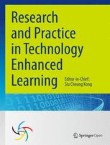Research and Practice in Technology Enhanced Learning is the official journal of The Asia-Pacific Society for Computers in Education.
Aims and scope
Aims and scope
Research and Practice in Technology Enhanced Learning (RPTEL) is a multidisciplinary refereed journal devoted to disseminating rigorous research on all aspects of the use of technology to enhance learning. RPTEL is the official journal of The Asia-Pacific Society for Computers in Education (APSCE). The journal seeks to be a catalyst for multidisciplinary dialogue amongst researchers and practitioners worldwide in the fields of learning and cognition, education, and technology, with a view to improving practice and achieving real-world impact in technology enhanced learning. The journal encourages research from theoretical perspectives, research reports of evidence-based practice as well as praxis research work that focuses on the interface between theory and practice and how each can support the other. In addition, the journal strongly encourages reports of research carried out within or involving countries in the Asia-Pacific region. The journal embraces all forms of technology that may be used to enhance learning opportunities; it is not restricted to information and communications technologies. All aspects of the technology, from design to construction to implementation and evaluation, are of interest. Research contexts addressed include learning that takes place in schools, universities or colleges, in business or government organizations, as well as in informal learning settings. Learning may take place at the individual, group, organizational or societal level. Analyses of learning may apply at multiple levels. A key focus of the journal is to seek improvement in our understanding of designing for learning in such a way that the learning designs translate successfully into practice. Hence, empirically grounded evaluations of learning are especially important. A complementary focus of the journal relates to the environmental, social, and cultural contexts within which learning design interacts with and translates into practice.
Affiliated with
Annual Journal Metrics
-
Not applicable
This journal is indexed by
-
- DOAJ
- EBSCO Discovery Service
- EBSCO Education Research Complete
- EBSCO Education Source
- EBSCO TOC Premier
- Emerging Sources Citation Index
- ERIC
- Google Scholar
- OCLC WorldCat Discovery Service
- ProQuest Advanced Technologies & Aerospace Database
- ProQuest SciTech Premium Collection
- ProQuest Technology Collection
- ProQuest-ExLibris Primo
- ProQuest-ExLibris Summon
- SCOPUS
- ISSN: 1793-7078 (electronic)
